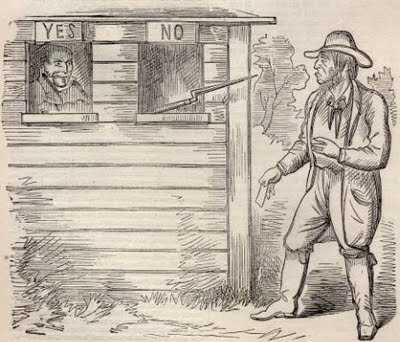
As voters arrived at their local precincts to vote on secession, many of them found armed forces awaiting them as they voted. Those who would oppose the secession vote were threatened with future treason trials, and in some cases were told they would be hung before they could even return home.
Precincts showed wide variations of results. Those precincts voting against secession were unoccupied by armed soldiers, while precincts with troops voted unanimously for succession, with citizens previously opposed to secession "changing their minds" at the polls when faced with armed advocates.
What I just described was the scene in Northern Virginia, in what is now the 8th Congressional District, in 1861 according to various written accounts at the time. The same type of fake democratic vote held under threats and occupation repeated itself this week in the Crimea region of Ukraine. This leads to the obvious question -- what do we do about it?
As a candidate for Congress I understand that if elected I would be called upon to cast votes next year on this issue, so I want to clearly lay out my position on how I would cast those votes.
I strongly support the initial sanctions that President Obama laid out in his remarks to the press this week. The Russian officials who were involved in the military seizure of Crimea should be prohibited from accessing assets they hold in the United States. Given the corruption in the Russian government, it is likely many of these officials may be financially profiting from the violation of Ukrainian sovereignty, so I strongly support limiting their ability to use their ill-gotten gains in the West.
In addition to those sanctions, I believe the United States government should be prepared to offer political asylum to any citizens of the Crimea who are able to flee the region. Physical access to Ukraine has been limited by Russian forces, and every American embassy and consulate in the region should be prepared to fast track asylum for residents of Crimea who are able to seek refuge within their walls.
Russia has announced that it reserves the right to "protect" ethnic Russian populations, which means that its leaders could be planning further military action in eastern Ukraine, and perhaps other former Soviet states. In my opinion, it would be a grave mistake to position U.S. troops in these border areas and risk an explosive conflict with the Russians.
The best way to limit Russian aggression is to strike at their economy, and thus their ability to finance these illegal operations. The largest sectors of the Russian economy are fossil fuels sold in world markets -- oil, natural gas and coal. While most of these resources are consumed in Asia and Europe, the cost of these products are settled in markets across the world- driven in part by large American demands for fossil fuels.
Congress should immediately act with an emergency bill to begin reducing our dependence on fossil fuels. Cleaner energy options based on wind, solar and other technologies already exist and are underutilized because we have not invested in building up those infrastructures; we have instead allowed other countries to surpass us in this critical sector. The consumption of fossil fuels has clearly become a national security issue as our consumption finances the Russian government and their ability to act as a regional aggressor.
The situation in Crimea is a reminder that we cannot continue to fund dangerous governments through worldwide energy markets. This situation is a reminder that we can not continue to do so and rely on the U.S. military to deal with every situation that arises when a country like Russia uses those resources to act aggressively. Congress must act immediately to impose the toughest sanction possible on Russia -- a major reduction of American demand for Russia's energy resources.
(image from "How Virginia Was Voted Out of the Union," Harper's Weekly, June 15, 1861)
